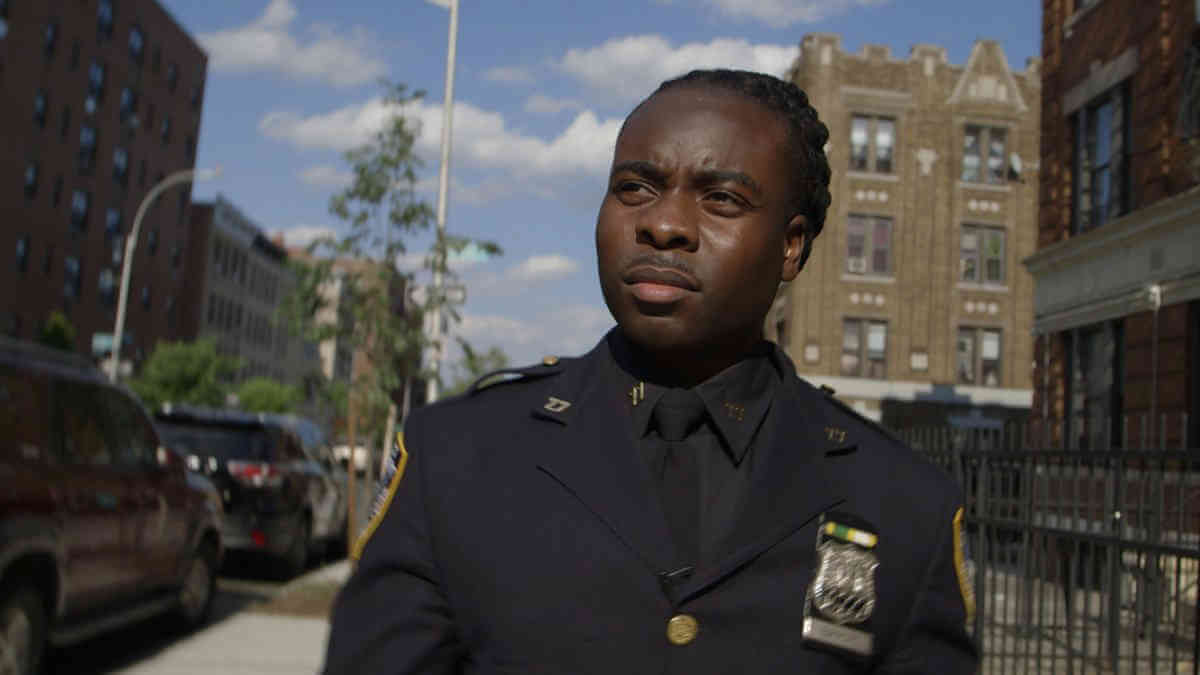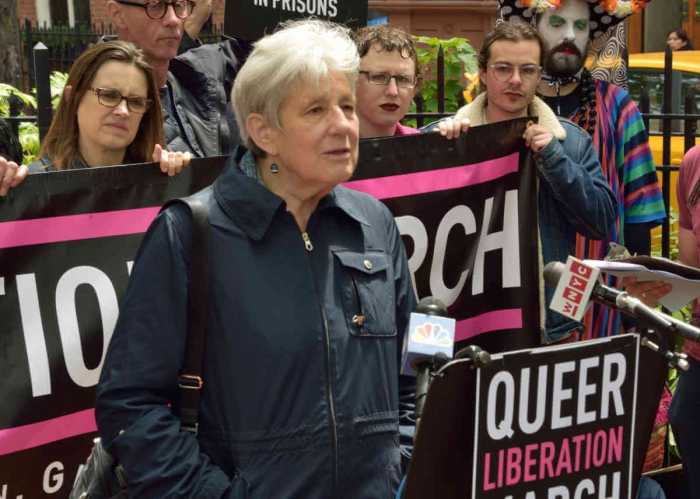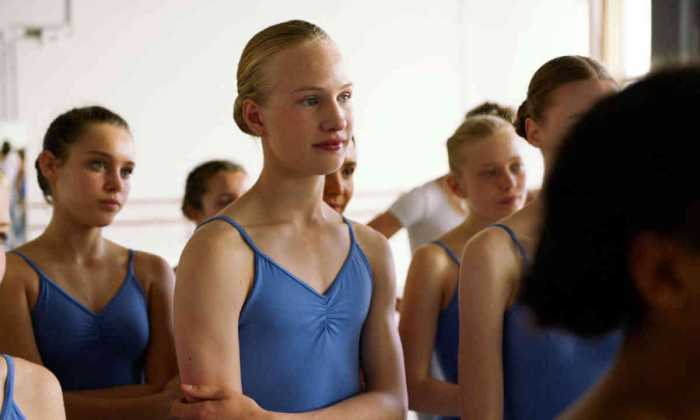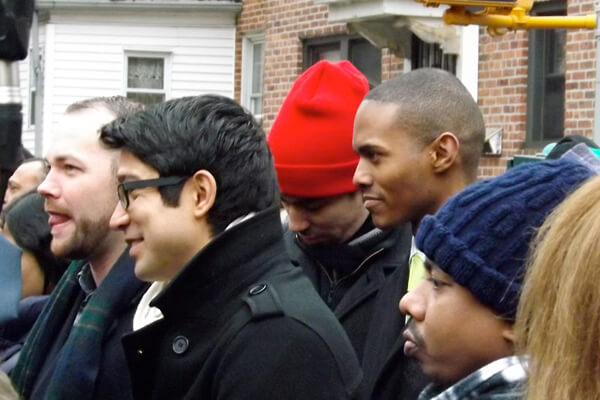As American films dumb down ever more, with mindless action and endless Marvel comic book heroes swamping the screen, anyone with intelligence needs to gratefully look at documentaries for substance, i.e., real stories about real people. One of the most important films of the year — a must-see for everyone — is “Crime + Punishment”, currently available on Hulu, directed, shot, and edited by Korean-American Stephen Maing. He focuses on the NYPD 12, a group of incredibly brave cops who spoke up about the pernicious and racist quota system of arrests, now supposedly illegal, which, however, is still being covertly enforced.
The department’s demands for a certain number of collars each month — with minority neighborhoods being targeted — has led to false arrests, police brutality, and even death, as in the case of choking victim Eric Garner. The doc’s central figure, Manny Gomez, who left the force over his disagreement with this policy, made it his mission to try and end it, incurring the wrath of seemingly the entire NYPD. He did break through to a few who’d shared his negative experience, like Edwin Raymond, a young cop and true individualist, who told me that his waist-length dreads alone had been written up four times. His superior officer confided in him that the fact that he was young, black, and outspoken resulted, early on, in a private departmental directive to “Fuck him up.”
Maing’s thoughtful, powerful direction of this factual “Serpico” follow-up keeps you riveted throughout, as your anger mounts, seeing retired Police Commissioner William “Broken Windows” Bratton smugly turning his back on the problem over his two terms of service — with many other white, middle-aged cops in power following suit. Your heart particularly aches for two women involved here — single, pregnant cop Felicia Whitely, who, along with every hardship imaginable in her personal life, faces the additional pressures of being one of the 12, and her fellow single mom, Jessica Perez. Her son, Pedro Hernandez, was arrested for a shooting he had nothing to do with apart from being unfortunately present at the incident, this being but one of the 25 false arrests he’d already endured. This resulted in his year-long incarceration at Rikers, as Gomez goes on a gripping quest to prove his innocence. His eventual release is triumphantly celebrated here, and it’s a testament to the young man that he refused all plea bargains, steadfastly maintaining his innocence, and emerged from the stir not hopelessly embittered but determined to get a college education.
The fact that “Serpico” was made nearly 50 years ago and, of course, did not end cop corruption, is truly sobering, but when I met Gomez at a recent reception honoring the film, he told me that he personally receives a lot of support from police — as well as civilians — these days, adding, “But the fight goes on.”
I was only halfway through watching Netflix’s “Quincy” (which like “Crime + Punishment” has been short-listed for an Oscar nomination), when I realized that its subject, Quincy Jones, is truly a one-man total history of American music of the last century. It is one of the best, most incisive, and revealing music movies ever made. Incredible access was granted to its director, which is maybe not such a big surprise as she happens to be the daughter of its subject, Rashida (co-directing with Alan Hicks). Typically when a family member is at the helm of such an enterprise, the result, especially when its focus happens to be living, can be less than totally objective, even a total whitewash. That is anything but the case here, for the portrait — running two hours and change, and still too short in my book — is amazingly warts and all.
Camera at the ready, daughter tracked her indefatigable 85-year-old Dad, who still maintains a punishing schedule: in the studio, performing all around the world, and even organizing, at President Barack Obama’s request, the Smithsonian’s National Museum of African-American History and Culture.
He is first shown, out on the town, receiving the breathless accolades and endearments of a host of adoring A-listers from Gaga to Beyoncé to Willie Nelson, then climbing into a limo and telling Rashida, “I could party all day!” The screen next turns black, and it is subsequently revealed that he collapsed into a diabetic coma he was never supposed to recover from. But recover he does, lying inertly in a hospital bed, but sparking to life when a doctor tests him by asking who the president is. “Sarah Palin,” he replies, and this natural wit is only a part of what makes him such a monumentally compelling topic.
Jones grew up hard on the South Side of Chicago, attacked by knives (one straight through his hand, which has a still extant scar) before he was 10, and, at seven, watching his mentally unstable mother being thrown into a straight-jacket and hauled away. A chance encounter with a piano he came across in a deserted basement had him childishly noodling away on it — and next sending this fireball into motion. After an apprenticeship as a gifted young trumpeter alongside giants he still reveres — including Duke Ellington and Count Basie — Jones became a conductor on his own and an arranger, working with Sinatra on “Fly Me to the Moon,” which both were honored to hear played on the lunar surface during that historic initial landing in 1969.
He also became the first black Hollywood movie composer, in an ignorant age that had producers wondering if someone black could write appropriate music for white stars on the screen. His recording work continued, with the cream of talent’s crop, culminating in his collaboration with Michael Jackson, specifically on the album “Thriller,” the top-selling record of all time. (Although he’s earned $18 million in royalties since the singer’s death, he has sued the Jackson estate for the $30 million he was owed in total.)
Jones’ partying took its toll, and he’s been on the wagon, heath-kicking it since that coma, though he collapses once more in the film, onstage while on a European tour.
Through it all, he emerges as a true living legend, but more down-to-earth and authentically funny than you might think — someone you’d kill to just kick it with and hear all the stories because he knew everybody. He even admits to one thing he can’t do: “Marriage.” Still, he managed three wives, including Rashida’s mother Peggy Lipton, and a total of seven kids by five women. His lovers included Hazel Scott, Marpessa Dawn, Juliette Gréco, Freda Payne, Nastassja Kinski, a raft of Playboy models, and — would you believe it? — Ivanka Trump. He claims to currently having 22 girlfriends around the world who all know each other.
In an interview with Vulture last year, his sublimely unfiltered words proved too revealing for many and he was forced into a public apology after an intervention by his five daughters. He may have said “Sorry,” but he never walked back anything he uttered — including his claim that buddy Marlon Brando had slept with Richard Pryor, James Baldwin, and Marvin Gaye: ““Brando used to go cha-cha dancing with us. He could dance his ass off. He was the most charming motherfucker you ever met. He’d fuck anything. Anything! He’d fuck a mailbox.”
And Brando himself, in a 1976 interview in France, said, “Homosexuality is so much in fashion, it no longer makes news. Like a large number of men, I, too, have had homosexual experiences, and I am not ashamed.”
And just because, I’ll quote what he said about our current First Family: “Trump and [his] uneducated rednecks. Trump is just telling them what they want to hear. I used to hang out with him. He’s a crazy motherfucker. Limited mentally — a megalomaniac, narcissistic. I can’t stand him. I used to date Ivanka, you know. Twelve years ago. Tommy Hilfiger, who was working with my daughter [model and designer] Kidada, said, ‘Ivanka wants to have dinner with you.’ I said, ‘No problem. She’s a fine motherfucker.’ She had the most beautiful legs I ever saw in my life. Wrong father, though.”
Hey Rashida, let Daddy talk and keep that camera running. There’s a whole other doc you’ve got here!




































